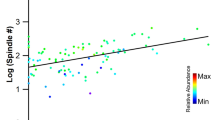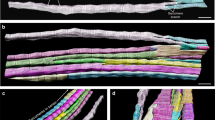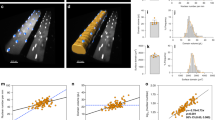Abstract
THE histology and physiology of both fast and slow types of cat striated muscle were studied in detail by Denny-Brown1. He reported that the histological appearance did not distinguish definitely between the functionally fast and functionally slow type of muscle fibre. From his physiological investigations he concluded that the typically fast muscles (for example, gastrocnemius) were specialized for phasic contractions, whereas the typically slow muscles (for example, soleus) were utilized for tonic contractions. He suggested that a comparable arrangement of fast gastrocnemius and slow soleus might be found in many animals, including man.
This is a preview of subscription content, access via your institution
Access options
Subscribe to this journal
Receive 51 print issues and online access
$199.00 per year
only $3.90 per issue
Buy this article
- Purchase on Springer Link
- Instant access to full article PDF
Prices may be subject to local taxes which are calculated during checkout
Similar content being viewed by others
References
Denny-Brown, D., Proc. Roy. Soc., B, 104, 371 (1929).
Eccles, J. A., Eccles, R. M., and Lundberg, A., Nature, 179, 866 (1957). Buller, A. J., Eccles, J. C., and Eccles, R. M., J. Physiol., 143, 23P (1958).
Author information
Authors and Affiliations
Rights and permissions
About this article
Cite this article
BULLER, A., DORNHORST, A., EDWARDS, R. et al. Fast and Slow Muscles in Mammals. Nature 183, 1516–1517 (1959). https://doi.org/10.1038/1831516a0
Issue Date:
DOI: https://doi.org/10.1038/1831516a0
This article is cited by
-
Mechanomyographic assessment of contractile properties within seven segments of the human deltoid muscle
European Journal of Applied Physiology (2007)
-
A comparison of the contractile properties of the human gastrocnemius and soleus muscles
European Journal of Applied Physiology and Occupational Physiology (1983)
-
Contractile properties of the human triceps surae with some observations on the effects of temperature and exercise
European Journal of Applied Physiology and Occupational Physiology (1982)
-
Summation of Motor Units in a Mechanically Elicited Phasic Stretch Reflex in Human Subjects
Nature (1967)
Comments
By submitting a comment you agree to abide by our Terms and Community Guidelines. If you find something abusive or that does not comply with our terms or guidelines please flag it as inappropriate.



